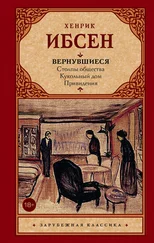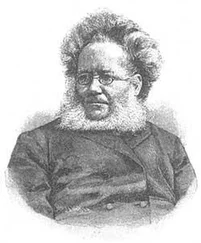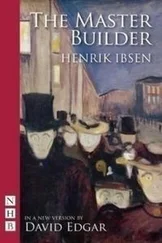Billing. Hear hear!
Dr. Stockmann. We only need to stand by one another, and it will all be perfectly easy. The revolution will be launched like a ship that runs smoothly off the stocks. Don't you think so?
Hovstad. For my part I think we have now a prospect of getting the municipal authority into the hands where it should lie.
Aslaksen. And if only we proceed with moderation, I cannot imagine that there will be any risk.
Dr. Stockmann. Who the devil cares whether there is any risk or not! What I am doing, I am doing in the name of truth and for the sake of my conscience.
Hovstad. You are a man who deserves to be supported, Doctor.
Aslaksen. Yes, there is no denying that the Doctor is a true friend to the town—a real friend to the community, that he is.
Billing. Take my word for it, Aslaksen, Dr. Stockmann is a friend of the people.
Aslaksen. I fancy the Householders' Association will make use of that expression before long.
Dr. Stockmann (affected, grasps their hands). Thank you, thank you, my dear staunch friends. It is very refreshing to me to hear you say that; my brother called me something quite different. By Jove, he shall have it back, with interest! But now I must be off to see a poor devil—I will come back, as I said. Keep a very careful eye on the manuscript, Aslaksen, and don't for worlds leave out any of my notes of exclamation! Rather put one or two more in! Capital, capital! Well, good–bye for the present—goodbye, goodbye! (They show him to the door, and bow him out.)
Hovstad. He may prove an invaluably useful man to us.
Aslaksen. Yes, so long as he confines himself to this matter of the Baths. But if he goes farther afield, I don't think it would be advisable to follow him.
Hovstad. Hm!—that all depends—
Billing. You are so infernally timid, Aslaksen!
Aslaksen. Timid? Yes, when it is a question of the local authorities, I am timid, Mr. Billing; it is a lesson I have learned in the school of experience, let me tell you. But try me in higher politics, in matters that concern the government itself, and then see if I am timid.
Billing. No, you aren't, I admit. But this is simply contradicting yourself.
Aslaksen. I am a man with a conscience, and that is the whole matter. If you attack the government, you don't do the community any harm, anyway; those fellows pay no attention to attacks, you see—they go on just as they are, in spite of them. But local authorities are different; they can be turned out, and then perhaps you may get an ignorant lot into office who may do irreparable harm to the householders and everybody else.
Hovstad. But what of the education of citizens by self government—don't you attach any importance to that?
Aslaksen. When a man has interests of his own to protect, he cannot think of everything, Mr. Hovstad.
Hovstad. Then I hope I shall never have interests of my own to protect!
Billing. Hear, hear!
Aslaksen (with a smile). Hm! (Points to the desk.) Mr. Sheriff Stensgaard was your predecessor at that editorial desk.
Billing (spitting). Bah! That turncoat.
Hovstad. I am not a weathercock—and never will be.
Aslaksen. A politician should never be too certain of anything, Mr. Hovstad. And as for you, Mr. Billing, I should think it is time for you to be taking in a reef or two in your sails, seeing that you are applying for the post of secretary to the Bench.
Billing. I—!
Hovstad. Are you, Billing?
Billing. Well, yes—but you must clearly understand I am only doing it to annoy the bigwigs.
Aslaksen. Anyhow, it is no business of mine. But if I am to be accused of timidity and of inconsistency in my principles, this is what I want to point out: my political past is an open book. I have never changed, except perhaps to become a little more moderate, you see. My heart is still with the people; but I don't deny that my reason has a certain bias towards the authorities—the local ones, I mean. (Goes into the printing room.)
Billing. Oughtn't we to try and get rid of him, Hovstad?
Hovstad. Do you know anyone else who will advance the money for our paper and printing bill?
Billing. It is an infernal nuisance that we don't possess some capital to trade on.
Hovstad (sitting down at his desk). Yes, if we only had that, then—
Billing. Suppose you were to apply to Dr. Stockmann?
Hovstad (turning over some papers). What is the use? He has got nothing.
Billing. No, but he has got a warm man in the background, old Morten Kiil—"the Badger," as they call him.
Hovstad (writing). Are you so sure he has got anything?
Billing. Good Lord, of course he has! And some of it must come to the Stockmanns. Most probably he will do something for the children, at all events.
Hovstad (turning half round). Are you counting on that?
Billing. Counting on it? Of course I am not counting on anything.
Hovstad. That is right. And I should not count on the secretaryship to the Bench either, if I were you; for I can assure you—you won't get it.
Billing. Do you think I am not quite aware of that? My object is precisely not to get it. A slight of that kind stimulates a man's fighting power—it is like getting a supply of fresh bile—and I am sure one needs that badly enough in a hole–and–corner place like this, where it is so seldom anything happens to stir one up.
Hovstad (writing). Quite so, quite so.
Billing. Ah, I shall be heard of yet!—Now I shall go and write the appeal to the Householders' Association. (Goes into the room on the right.)
Hovstad (sitting al his desk, biting his penholder, says slowly). Hm!—that's it, is it. (A knock is heard.) Come in! (PETRA comes in by the outer door. HOVSTAD gets up.) What, you!—here?
Petra. Yes, you must forgive me—
Hovstad (pulling a chair forward). Won't you sit down?
Petra. No, thank you; I must go again in a moment.
Hovstad. Have you come with a message from your father, by any chance?
Petra. No, I have come on my own account. (Takes a book out of her coat pocket.) Here is the English story.
Hovstad. Why have you brought it back?
Petra. Because I am not going to translate it.
Hovstad. But you promised me faithfully.
Petra. Yes, but then I had not read it, I don't suppose you have read it either?
Hovstad. No, you know quite well I don't understand English; but—
Petra. Quite so. That is why I wanted to tell you that you must find something else. (Lays the book on the table.) You can't use this for the "People's Messenger."
Hovstad. Why not?
Petra. Because it conflicts with all your opinions.
Hovstad. Oh, for that matter—
Petra. You don't understand me. The burden of this story is that there is a supernatural power that looks after the so–called good people in this world and makes everything happen for the best in their case—while all the so–called bad people are punished.
Hovstad. Well, but that is all right. That is just what our readers want.
Petra. And are you going to be the one to give it to them? For myself, I do not believe a word of it. You know quite well that things do not happen so in reality.
Hovstad. You are perfectly right; but an editor cannot always act as he would prefer. He is often obliged to bow to the wishes of the public in unimportant matters. Politics are the most important thing in life—for a newspaper, anyway; and if I want to carry my public with me on the path that leads to liberty and progress, I must not frighten them away. If they find a moral tale of this sort in the serial at the bottom of the page, they will be all the more ready to read what is printed above it; they feel more secure, as it were.
Petra. For shame! You would never go and set a snare like that for your readers; you are not a spider!
Читать дальше









